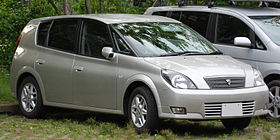Toyota Opa
This article relies largely or entirely on a single source. (February 2019) |
| Toyota Opa (XT10) | |
|---|---|
 2000 Toyota Opa | |
| Overview | |
| Manufacturer | Toyota |
| Production | January 2000[1] – July 2005 |
| Assembly | Japan: Toyota City, Aichi (Tsutsumi plant) |
| Body and chassis | |
| Class | Compact car |
| Body style | 5-door hatchback |
| Layout | Front-engine, front-wheel-drive Front-engine, four-wheel-drive (1.8 L only) |
| Platform | Toyota MC platform |
| Related | Toyota Vista (V50) |
| Powertrain | |
| Engine | Petrol: 1794 cc 1ZZ-FE I4 (ZCT10/15) 1998 cc1AZ-FSE I4 (ACT10) |
| Transmission | 4-speed automatic (1.8 L) CVT (2.0 L) |
| Dimensions | |
| Wheelbase | 2,700 mm (110 in) |
| Length | 4,250 mm (167 in) |
| Width | 1,695 mm (66.7 in) |
| Height | 1,525 mm (60.0 in) |
| Curb weight | 1,210–1,310 kg (2,668–2,888 lb) |
The Toyota Opa (Japanese: トヨタ・Opa (オーパ), Hepburn: Toyota Ōpa) is a compact car produced by Toyota. Its name derives from the exclamation for surprise in Portuguese.[2]
It was introduced at the October 1999 Tokyo Motor Show as a prototype car, and was put into production in January 2000. It was the result of the V50 Vista Ardeo wagon modified into a 5-door hatchback. The transmission shifter was relocated from the floor between the front seats to a location on the lower portion of the dashboard, allowing passengers to walk to the rear area from either front seat. It was initially available with the 1.8-litre 1ZZ-FE engine. Later in August 2000, the Opa was offered to customers with the 2.0-litre 1AZ-FSE engine and a continuously variable transmission. In January 2001, the GPS navigation was offered as an option.
The Opa was exclusive to Toyopet Store locations as a larger companion to the Caldina station wagon. It was discontinued in August 2005.
-
Rear view
-
2002 Toyota Opa
References[edit]
- ^ "In-depth Vehicle Information, Specification | Opa". 75 Years of Toyota. Toyota. 2012. Retrieved 2018-12-30.
- ^ "Vehicle Lineage Chart | Data: Origin of a car's name". 75 Years of Toyota. Toyota. 2012. Retrieved 2021-07-30.


